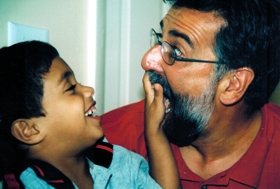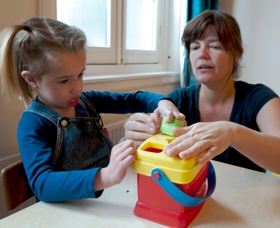The Methods We Use
The Growing Minds program draws from the best methods available in autism education and treatment to help your child. Like all children, those with autism benefit most from a rich and varied curriculum of methods that are appropriate for their developmental stage. We have been successfully integrating attitudinal, play-based and evidence-based methods for over 14 years.
 Attitudinal Methods
Attitudinal Methods
Our attitudes, thoughts and feelings are extremely important when we parent or teach a child with autism, directly influencing how much the child enjoys relationships and often having a greater impact on our effectiveness than techniques or strategies. Attitudinal training helps parents and teachers to be more comfortable, inspired and optimistic. By learning to use the power of attitude, we can become more effective at motivating the child and facilitating behavioral change. In addition, attitudinal training helps parents and teachers to increase confidence and motivation while reducing stress and burnout. Read more about attitudinal training.
Each member of the Growing Minds team has extensive training and expertise in providing attitudinal support and training. In addition, we offer the option for parents to include counseling sessions with licensed psychotherapist Kaitryn Wertz, LMHC. Kaitryn draws upon 30 years of experience helping parents whose children have autism to alleviate stress, marital conflict, depression, burnout and other frequent parent concerns.
Play-Based Methods
Our team has extensive training and experience in play-based methods. We are experts at using play methods to make ourselves extremely fun, interesting and enjoyable for the child. We train parents and teachers to use these methods to increase eye contact, increase the frequency of verbal behavior and inspire the child to be more affectionate and prefer the company of others. One of our specialties is the seamless integration of play-based methods with evidence-based methods.
Evidence-Based Methods
 The National Professional Development Center on Autism Spectrum Disorders has identified practices that have been proven to be effective in helping children and adolescents with autism. These are referred to as “Evidence-Based Practices.” Of the twenty-four methods that they endorse, we use nineteen in our work. We routinely use combinations of these methods, according to the needs of the individual child.
The National Professional Development Center on Autism Spectrum Disorders has identified practices that have been proven to be effective in helping children and adolescents with autism. These are referred to as “Evidence-Based Practices.” Of the twenty-four methods that they endorse, we use nineteen in our work. We routinely use combinations of these methods, according to the needs of the individual child.
We also utilize the majority of evidence-based practices outlined by the National Standards Project of the National Autism Center. These two organizations are the leading authorities in evidence-based practices for helping people with autism.
We are trained in using the following evidence-based methods with special expertise in making these methods fun and playful for the child:
Read a brief explanation for all these methods...
- Antecedent-Based Interventions (ABI)
- Computer-Aided Instruction
- Differential Reinforcement
- Discrete Trial Training
- Extinction
- Functional Behavior Assessment
- Functional Communication Training
- Naturalistic Intervention
- Parent-Implemented Intervention
- Picture Exchange Communication System (PECS)
- Prompting
- Reinforcement
- Response Interruption/Redirection
- Social Narratives
- Speech Generating Devices/VOCA
- Task Analysis
- Time Delay
- Video Modeling
- Visual Supports